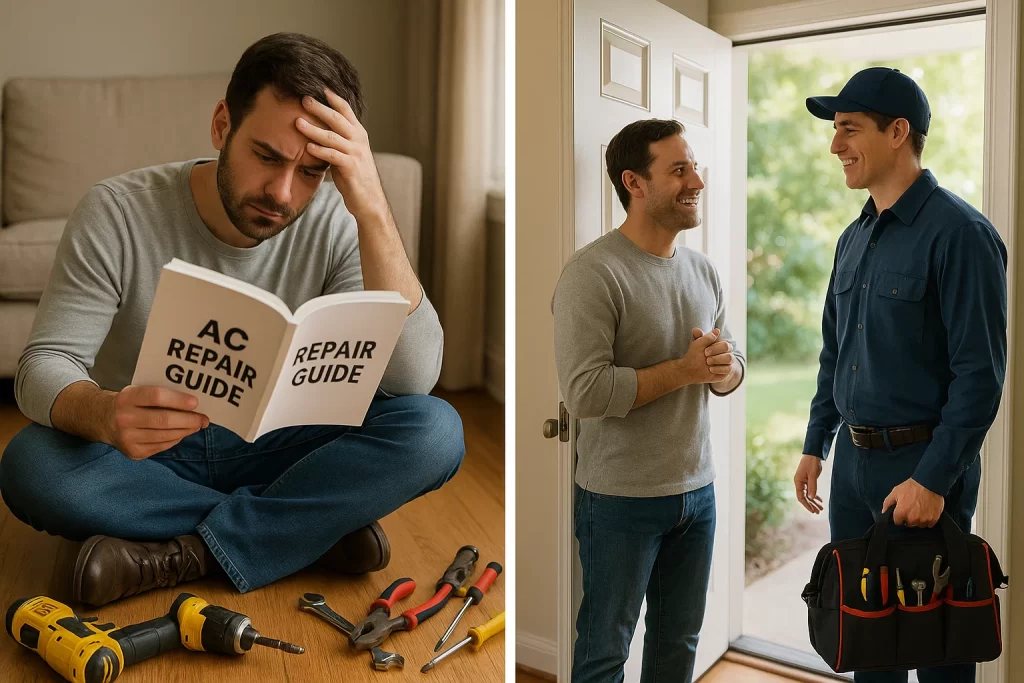When your air conditioner starts acting up in the middle of a summer heatwave, your first instinct might be to fix it yourself. And while some basic troubleshooting can be helpful, not every AC problem is a safe or smart DIY project.
Knowing the difference between what you can handle on your own and when to call in a professional like those on our team can save you time, money, and frustration—while also protecting your home comfort and safety. Let’s break down what you can do yourself, and when it’s best to bring in the experts.

Common AC Issues You Can Handle Yourself
There are a few simple AC problems that homeowners can often troubleshoot without needing professional help:
1. Dirty Air Filter
One of the most common causes of poor AC performance is a clogged air filter. A dirty filter restricts airflow, making your system work harder and reducing its efficiency. Replacing or cleaning the filter every 1–3 months is a quick and easy fix.
2. Thermostat Problems
If your AC isn’t kicking on, check your thermostat settings. Make sure it’s set to “cool” and the temperature is lower than the current room temperature. Also, replace the batteries if it’s not turning on.
3. Tripped Breaker
Sometimes, a power surge can trip the breaker for your AC system. Check your electrical panel and reset any tripped breakers—but if it keeps happening, that’s a job for a professional.
4. Blocked Vents or Outdoor Unit
Ensure nothing is blocking your indoor vents or outdoor condenser unit. Leaves, dirt, or furniture can obstruct airflow. Clearing away these obstructions can help your AC function better.
When It’s Time to Call Our Professional Team
Some problems go beyond DIY territory and require the expertise, tools, and training of a certified HVAC technician. Here’s when you should leave it to the pros:
1. Refrigerant Leaks
Low refrigerant levels can indicate a leak, which not only harms your system but can also be hazardous to handle without proper certification. A pro is required to safely detect and repair leaks and recharge your system.
2. Electrical Issues
If your AC unit repeatedly trips breakers, doesn’t turn on, or emits burning smells, you could have an electrical problem. These can be dangerous and should never be handled without proper training.
3. Frozen Coils
Frozen evaporator coils can cause your AC to blow warm air or stop working entirely. While you can turn off the unit and let it thaw, a technician will need to identify and resolve the underlying cause.
4. Unusual Noises or Odors
Grinding, banging, hissing, or musty odors can point to failing components, mold, or other serious issues. Ignoring these signs can lead to more costly damage over time.
5. System Short Cycling
If your AC turns on and off rapidly, it’s not operating efficiently and may be signaling a deeper problem, like a faulty thermostat or oversized unit. This issue affects energy usage and system longevity.
Protect Your Comfort—and Your System
Your air conditioner is a complex machine, and while there’s no harm in handling basic maintenance, tackling advanced repairs on your own can do more harm than good. When in doubt, it’s always safer—and smarter—to trust the professionals.
Contact ThermAll Heating & Cooling, Inc: We are “Your Home Comfort Hero!”
